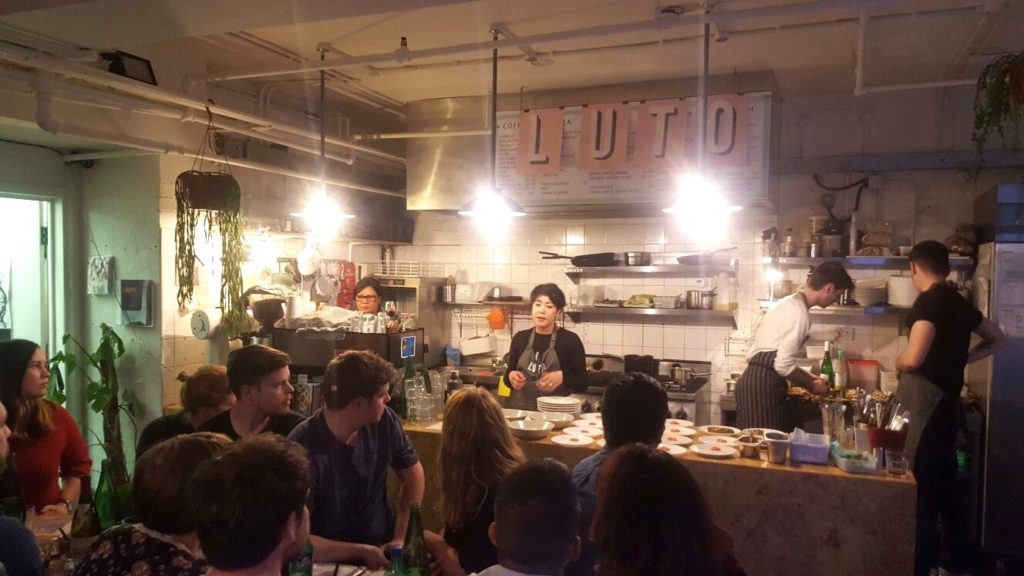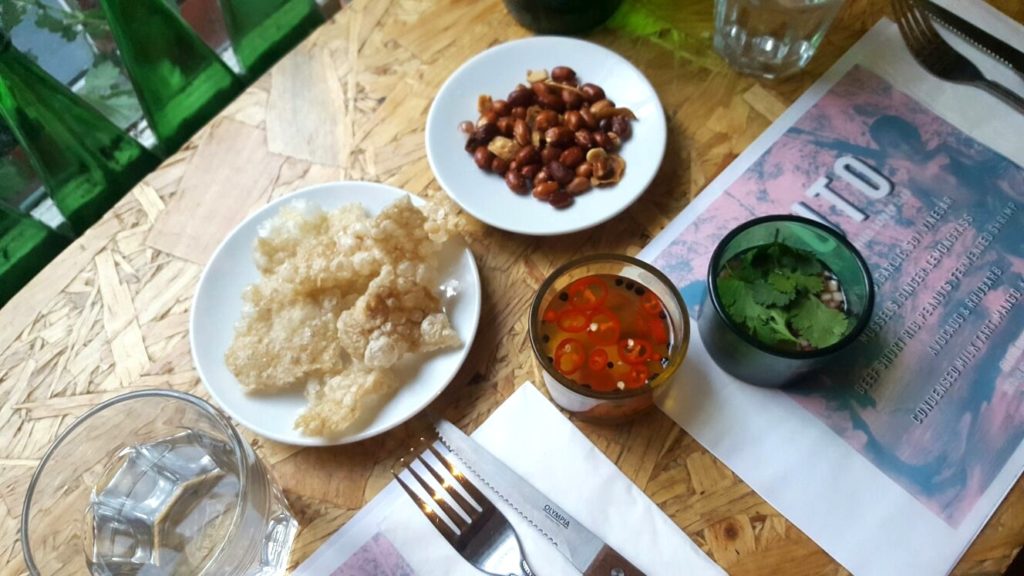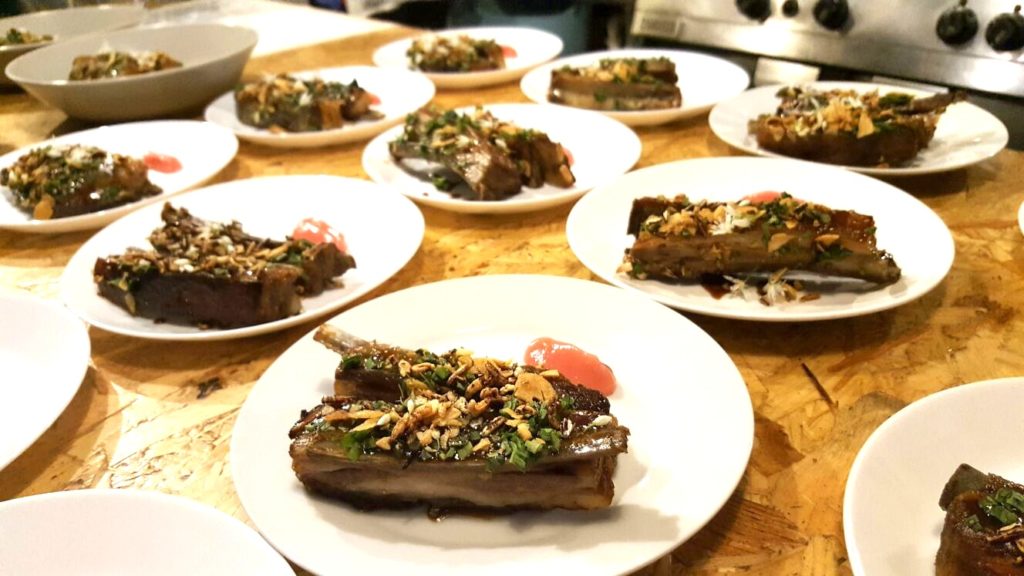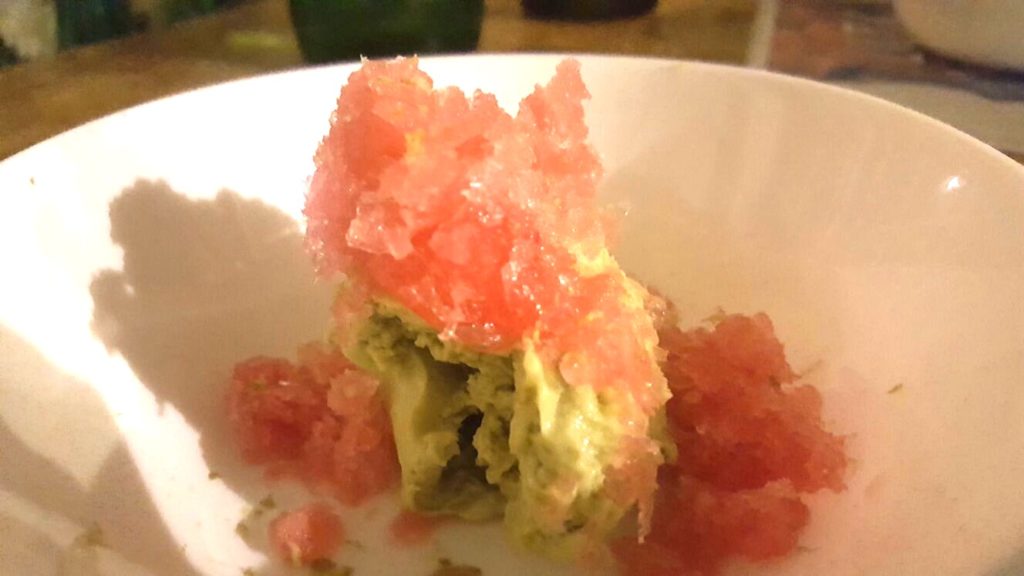Filipino-ish supper club drawing crowds at London’s artsy East End

Filipino-British chef Mary San Pablo tells supper club diners the origins of the dishes she is serving. INQUIRER/Melissa Alcantara
LONDON – In London’s East End creative heartland, around the corner from Dalston Overground station, LUTO London, a Filipino-inspired supper club, is about to begin.
The atmosphere inside Brunswick East, an industrial-chic café decked out with potted plants and indie magazines, is intimate and relaxed, with wooden stools and tables close together.
Despite the small venue, the place is buzzing, with early-comers snacking on bowls of garlic peanuts and pork crackling sitting atop the artfully designed placemats on each table.
A few Filipino faces are seen here and there, but for the most part, a typically diverse crowd of Londoners sip their wine, chatting excitedly, primed for a new culinary experience.
LUTO London
LUTO London was established in 2015 by the energetic Mary San Pablo, a Brit-Fil fashion buyer turned high-end chef, whose passion for food and cooking blossomed in her early twenties. Since opening, LUTO London’s supper clubs have consistently sold out.

Pork crackling and garlic peanuts starter at Luto London Filipino supper club. INQUIRER/Melissa Alcantara
Mary, bustling around the kitchen, is helped by three assistants – Flora, a Filipina friend of her mother, and two fellow English chefs, Max and Connor, who met Mary while working at L’Autre Pied, one of Marylebone’s most upscale restaurants.
“Mary just throws random Asian dishes at me before every dinner and I have to come up with a great wine selection,” Max jokes to the crowd, before expertly recommending a variety of wines he has picked out especially for the menu.
LUTO serves up a storm: adobo-style lamb ribs marinated in soy and vinegar; mussel soup with ginger and lemongrass (tinolang tahong); and beef short rib in peanut sauce with fermented shrimp paste (kare-kare); all enjoyed with a side of steaming garlic rice and cabbage.
In true Filipino style, dessert is an eclectic mix of fruity and milky flavors. First up is an avocado gelato served with tangy rhubarb shaved ice; the second treat is a spine-tinglingly sweet condensed milk tart, with a citrusy mango and calamansi custard to complement.
Filipino food with a side of historical context
Throughout the evening, Mary’s passion for educating diners about the Philippines through her food becomes clear. As a dish is served up, she explains its origins to the diners, highlights the key ingredients and drops in some poignant cultural context.

Lamb ribs with soy vinegar garlic marinade at Luto London. INQUIRER/Melissa Legarda
“The most important thing for me, doing this supper club, is to help people to appreciate what they’re eating,” Mary tells me later over a beer, winding down after another successful evening.
“Home-cooked Filipino food is really rich, and in the UK it’s often not presented in a way that makes it understandable for anyone other than Filipinos. It’s the biggest stumbling block for anyone thinking of trying or exploring Filipino food.”
Mary’s parents never cooked, so Mary knew very little about Filipino food before embarking on her own culinary journey: “I didn’t have recipes handed down to me. I gathered all the recipes I could and experimented by myself. If I asked my mother, ‘What do you use this for?’ she’d say, ‘I don’t know, ask your auntie.’”
“I’ve had to teach myself, and I love that,” adds Mary. “I love that I’m learning by myself.”
Switching fashion for passion
Born in North London, Mary always knew she wanted to do something creative, but opted for the more “sensible” choice of studying business economics.
“I did well throughout my studies, but I didn’t really enjoy it. I have quite an entrepreneurial mindset anyway so that helps.”
After graduating, she decided to pursue something more creative, eventually landing her dream fashion job: a buying position at Topshop. It was only in her mid-twenties that Mary began loving food.
“I started trying out great restaurants and cooking more regularly. I spent all my weekends making dinners for friends with lashings of wine. Then I realized I wanted to learn some dinner party tips, so I applied to some of my favorite restaurants, like Moro in St. John’s Wood.”
Mary soon started cooking at renowned Marylebone restaurant L’Autre Pied every Saturday, after a long week at her fashion 9-to-5. Eventually, after working “crazy shifts,” she realized she needed to quit her job and transition full-time into cooking. Her ultimate goal was to start a Filipino restaurant, or supper club.
“I started testing out recipes on my days off,” she recalls. “I found a place, and here we are. But it’s a massive operation. I’ve got three people helping me, I couldn’t do it without them. It’s hefty work. I prepare the whole thing at home and bring it here.”

Luto London’s avocado ice-cream and rhubarb-shaved-ice dessert. INQUIRER/Melissa Alcantara
“Honestly, it’s a labor of love. I couldn’t do it unless I loved it. I do everything from designing the menus to stamping the napkins.”
Cultivating her roots
As a second-generation Filipino, Mary struggled with her identity as a child: “When I was younger, my Polish friends went to Polish school and I wondered why I had no Filipino school. I think that when you grow up, your identity really starts to matter. Doing supper clubs now, I enjoy learning the history because I’m learning about my own country.”
The response has only grown more positive as Mary continues experimenting with traditional recipes and cooking for new crowds under LUTO London.
“Most people really, really like it – I always receive positive feedback,” beams the chef. “Filipino food is similar, yet different to other Southeast Asian cuisines; there’s a familiar flavor to what people know, but it’s that little bit different.”
“I started almost two years ago, and since then, I’ve had such an amazing response. The end goal is to have a restaurant, hundred percent. I have so many ideas, and I’m excited for the future.”
Book tickets and find out more information about the next supper club at www.lutolondon.com
-@illumelation